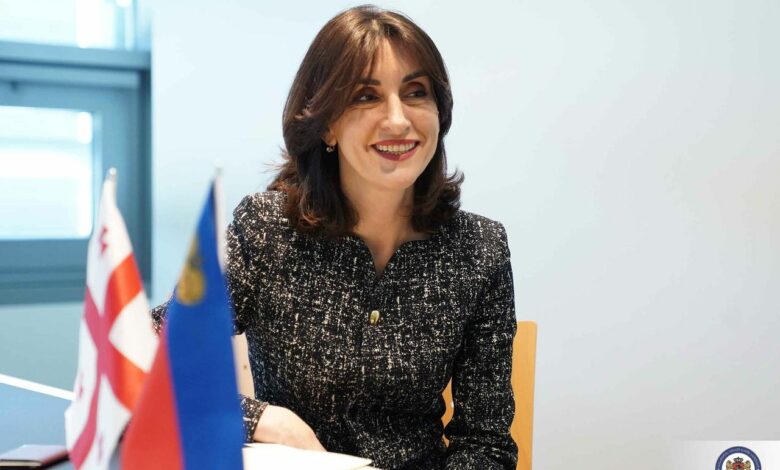
GD FM Botchorishvili Attends Council of Europe Session in Luxembourg
Georgian Dream Foreign Minister Maka Botchorishvili participated in the 134th session of the Committee of Ministers of the Council of Europe, held in Luxembourg on May 13-14. The session was convened at the invitation of Xavier Bettel, Chairman of the Committee of Ministers, Vice-Prime Minister of Luxembourg. Botchorishvili addressed the Ministerial session and met with Sabine Monauni, Deputy Prime Minister of Liechtenstein and Minister of Foreign Affairs, Minister of Foreign Affairs and Trade of Hungary, Péter Szijjártó, and Serbian Foreign Minister Marko Đurić. Several European leaders expressed concerns and disappointment over Georgia’s current political trajectory following the Ministerial session.
Maka Botchorishvili’s Speech at CoE’s Ministerial Session
GD Foreign Minister Maka Botchorishvili addressed the CoE’s Ministerial Session, the MFA reported on May 15. In her remarks, Botchorishvili emphasized the importance of peace and stability in the current geopolitical context, noting that adherence to international norms and principles is essential for ensuring both.
Botchorishvili reiterated that Abkhazia and the Tskhinvali region remain under the occupation, and Georgia firsthand experienced Russian aggression in 2008. She stressed the importance of international engagement in the peaceful resolution of the conflict.
Turning to broader democratic issues, Botchorishvili claimed that protecting democratic institutions should be a top priority and that the international community must respect the will of the people and refrain from encouraging political processes outside institutional frameworks.
Addressing ongoing political developments in Georgia, Botchorishvili alleged what she described as attempts by unnamed international actors to exert political pressure on the country. She underlined the importance of constructive cooperation based on mutual respect within international organizations.
She maintained that Georgia has positioned itself as a regional leader over the past decade. She cited improvements in the rule of law, human rights protections, and anti-corruption measures – achievements she claimed were reflected in international rankings and affirmed by rulings of the European Court of Human Rights.
Several European leaders answered Georgian online media Euroscope’s questions regarding the situation in the country, following the ministerial session.
Xavier Bettel voiced disappointment over Georgia’s current political trajectory. “The day we decided that they [Georgia] should have a European future, they decided to go backwards,” Bettel said. “We need to be honest with them [Georgian Dream] that if they go the wrong way, they will go further of a European future than it was the moment of last year. That’s my personal opinion.”
Alain Berset, Secretary General of the Council of Europe, also reflected critically on recent developments in Georgia. Recalling his visit to the country last December, Berset noted that the intention had been to engage all political stakeholders and support Georgia’s alignment with European values. He said that following the EU granting a candidate status to Georgia, “all the evolution that we witnessed in the recent months was a bad one, was not in a good direction.”
Berset added that the CoE’s team in Tbilisi is working through an action plan to support the European aspirations of the Georgian people, and to renew the dialogue between the political parties, “to have a structured dialogue, to be able to speak on all points, knowing that it’s not going in the right direction.”
He noted that the next 12 months will be decisive in determining Georgia’s path. “We want to have more convergence for the values, for democracy and the rule of law,” Berset emphasized.
Ian Borg, Malta’s Minister for Foreign Affairs and Tourism, expressed support for Berset’s engagement with Georgia. He added that “Georgia and its people need to be supported in order to reform and decide what they want for their country’s future. So we look forward to work together, even though we know it’s not easy.”
Meeting with Luxembourg’s Deputy PM Sabine Monauni
Botchorishvili held a meeting with Sabine Monauni, Deputy Prime Minister of the Principality of Liechtenstein and Minister of Foreign Affairs, Environment, and Culture. MFA reported that the parties discussed “the friendly bilateral relations and cooperation between the two countries within multilateral formats,” and global and regional security challenges.
According to the Ministry, Botchorishvili “briefed the Deputy Prime Minister of Liechtenstein on the situation in the occupied territories and underscored the importance of keeping the issue of Georgia’s occupation high on the Council of Europe’s agenda.”
Meeting with Hungary’s Minister of Foreign Affairs and Trade, Péter Szijjártó
Botchorishvili also talked with the Minister of Foreign Affairs and Trade of Hungary, Péter Szijjártó. The two sides discussed key issues related to their strategic bilateral relations and ongoing “fruitful cooperation” across various sectors.
MFA reported that particular emphasis was placed on cooperation in the fields of trade, economy, energy, and connectivity within the Black Sea region. The discussion also touched upon regional challenges and the situation in Georgia’s occupied territories.
“Both parties underlined the significance of the upcoming intergovernmental summit between Georgia and Hungary, scheduled to take place in Budapest on 11–12 June,” the MFA said. During the meeting, Hungary’s support for Georgia’s integration into the European Union was once again reaffirmed.
Talks with Serbian Foreign Minister Marko Đurić
On May 14, Botchorishvili also held a meeting with the Serbian Foreign Minister Marko Đurić, the MFA reported.
According to the Ministry, the two sides reaffirmed their mutual respect for the sovereignty and territorial integrity of both countries and welcomed the planned launch of direct flights between Georgia and Serbia in June. The Serbian side’s decision to open an embassy in Tbilisi was positively assessed “as a step that will further solidify the already friendly relations between the two nations.”
“In the context of European integration, the Georgian side underscored the importance of sharing Serbia’s and other Western Balkan countries’ experiences. The discussion also touched upon regional and global security challenges,” MFA said.
Also Read:
- 11/04/2025 – GD FM Botchorishvili Attends Delphi Economic Forum
- 24/03/2025 – GD FM Botchorishvili Visits Hungary
- 27/02/2025 – GD FM Botchorishvili Visits Turkey
- 25/02/2025 – GD FM Botchorishvili Meets UN Secretary-General, Addresses Human Rights Council